Rice University Football Stadium, September 12, 1962 – President John F. Kennedy put the United States and the rest of the world on notice. The US was going to put a man on the moon and bring him home safely by the end of the decade. He went on to say why he had committed the country to such a very hard thing, “We choose to go to the Moon in this decade and do the other things, not because they are easy, but because they are hard; because that goal will serve to organize and measure the best of our energies and skills, because that challenge is one that we are willing to accept, one we are unwilling to postpone, and one we intend to win, and the others, too.”
Countries, as well as companies, face numerous challenges during their lives. The President’s, or the CEO’s, job is to make right and courageous decisions to meet and surpass those challenges. Often that means facing and embracing fear, uncertainty and doubt (yours and others). If you’re the one making those decisions you had better have confidence in yourself and your organization to make it happen.
Confidence or bravado?
Perhaps some of both. Does it matter?
Yes, it matters. Bravado is associated with a boast or brag – an arrogant menace intended to intimidate. Bravado has no foundation or backup. It is full of sound and fury, signifying nothing. Bravado does not see consequences, it bets on the bluff.
Confidence, however, involves a trusting, a reliance or an “assurance of the mind” or a firm belief in the integrity, stability or veracity of another or in the truth and reality of fact. This can and often does rightly apply to one’s own abilities or competency.
Confidence is earned, bravado is stolen goods. Confidence speaks softly if at all, bravado shouts. Confidence stands while bravado cowers. Confidence acts, bravado talks. Confidence knows, bravado wishes. Confidence grows, bravado stagnates.
What’s the source of such confidence?
We know that self-confident people have qualities that everyone admires. Do they have something that the rest of us don’t? Did President Kennedy know how this very hard thing – a man on the moon and back safely – was to be done?
From my observation and experience, the best way to develop and have confidence – “to have full trust or reliance” – is to have a history of accomplishing hard things. This builds competence (the quality or state of having sufficient experience, knowledge, judgment, skill, or strength as for a particular duty or in a particular respect) and competence fuels confidence.
According to McKinsey&Company research, competent leadership solves problems and captures opportunities that improve performance.
Does this mean the boss should do those things alone? No. But they should get things done on their watch, via innumerable individual and collaborative efforts. This generally requires thinking strategically about performance challenges, smartly applying human capital to those challenges, and using problem solving processes that are most likely to succeed. You know, hard things (to get right).
Without this underlying competence (“experience, knowledge, judgment, skill, or strength”), you don’t have self-confidence. You can expect shallow over-compensating over-confidence. The difference between the two matters.
Know Thyself
In a Forbes article, professor Harry M. Jansen Kraemer, Jr. of Northwestern University’s Kellogg School of Management states, “becoming the best kind of leader isn’t about emulating a role model or a historic figure. Rather, your leadership must be rooted in who you are and what matters most to you. When you truly know yourself and what you stand for, it is much easier to know what to do in any situation. It always comes down to doing the right thing and doing the best you can”.
You conquer yourself when you do hard things.
Expect to struggle. Struggle does not mean failure but it leads to failure if you’re not strong enough and wise enough. The longer a problem stays hidden or buried, the longer it will stay unsolved.
The hardest job for any CEO is to manage your own mindset. Don’t tell me you never experience fear, uncertainty or doubt; don’t tell me you always have sufficient information to make important decisions; and don’t tell me you always know which path to take. I’ve been with too many of you over the years; I know better. You continually amaze me with your tolerance for ambiguity. The best of you confess – in private – that you often have stomachs full of butterflies, as well.
The butterflies will likely never go away, but we might be able to get them to fly in formation. It helps to focus on the road and not the roadblocks.
- Pay Attention – understand what’s happening, and face reality however harsh or beautiful it presents itself
- Employ triage – tackle the most important issues first
- Consider a variety of solutions – anticipate their likely impact: their upsides and risks, including downstream and unintended consequences.
- Implement – execute well
- Stay in touch and informed – learn, monitor and adjust as necessary
In Praise of Hard Things
President Kennedy said that we intend to go to the moon not because it’s easy but because it’s hard, “…because that goal will serve to organize and measure the best of our energies and skills.”
If we don’t to do hard things, we’ll never do great things. That’s why we do hard things.
Hard things will remain hard things, so embrace the struggle. It’s worthy work.
In Other Words
“If you trust in yourself. . .and believe in your dreams. . .and follow your star. . . you’ll still get beaten by people who spent their time working hard and learning things and weren’t so lazy.” ― Terry Pratchett, The Wee Free Men“
In The Word
“Consider it pure joy, my brothers and sisters, whenever you face trials of many kinds, 3 because you know that the testing of your faith produces perseverance.” –James 1:2-3 NIV


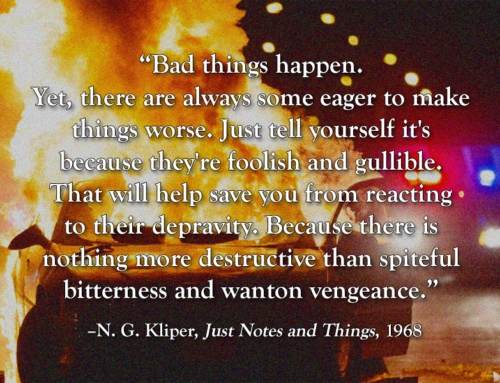
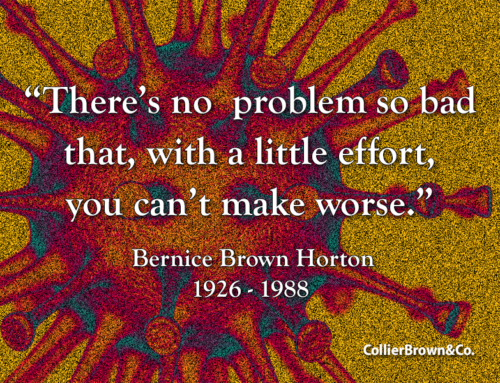

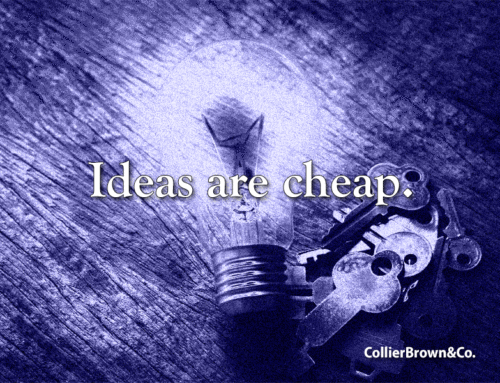
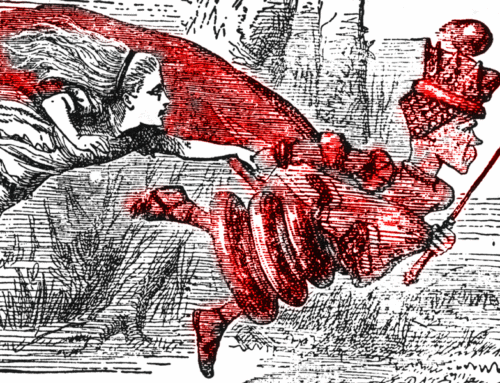
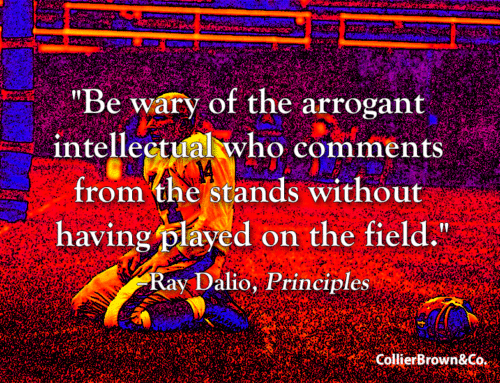
Leave A Comment